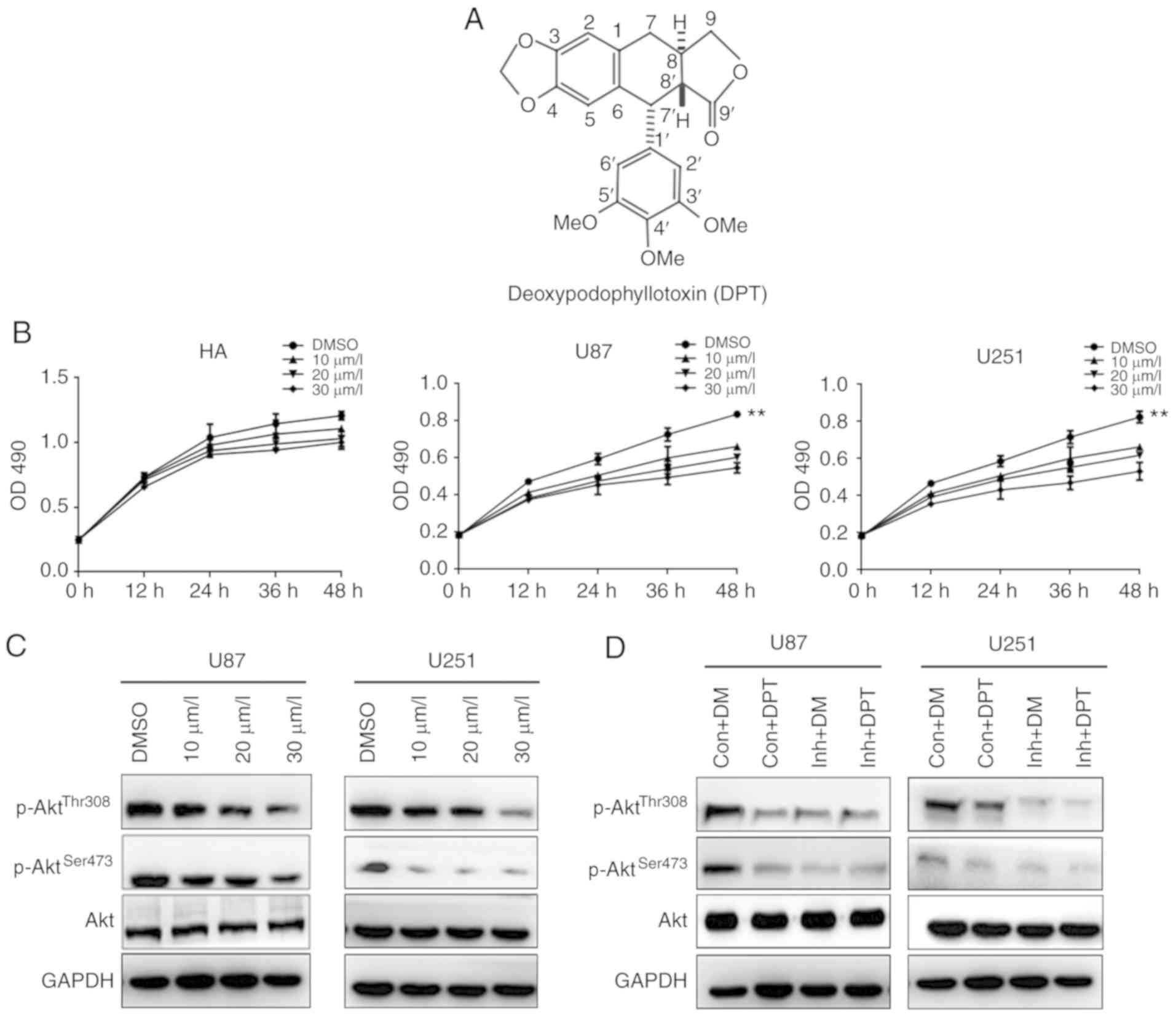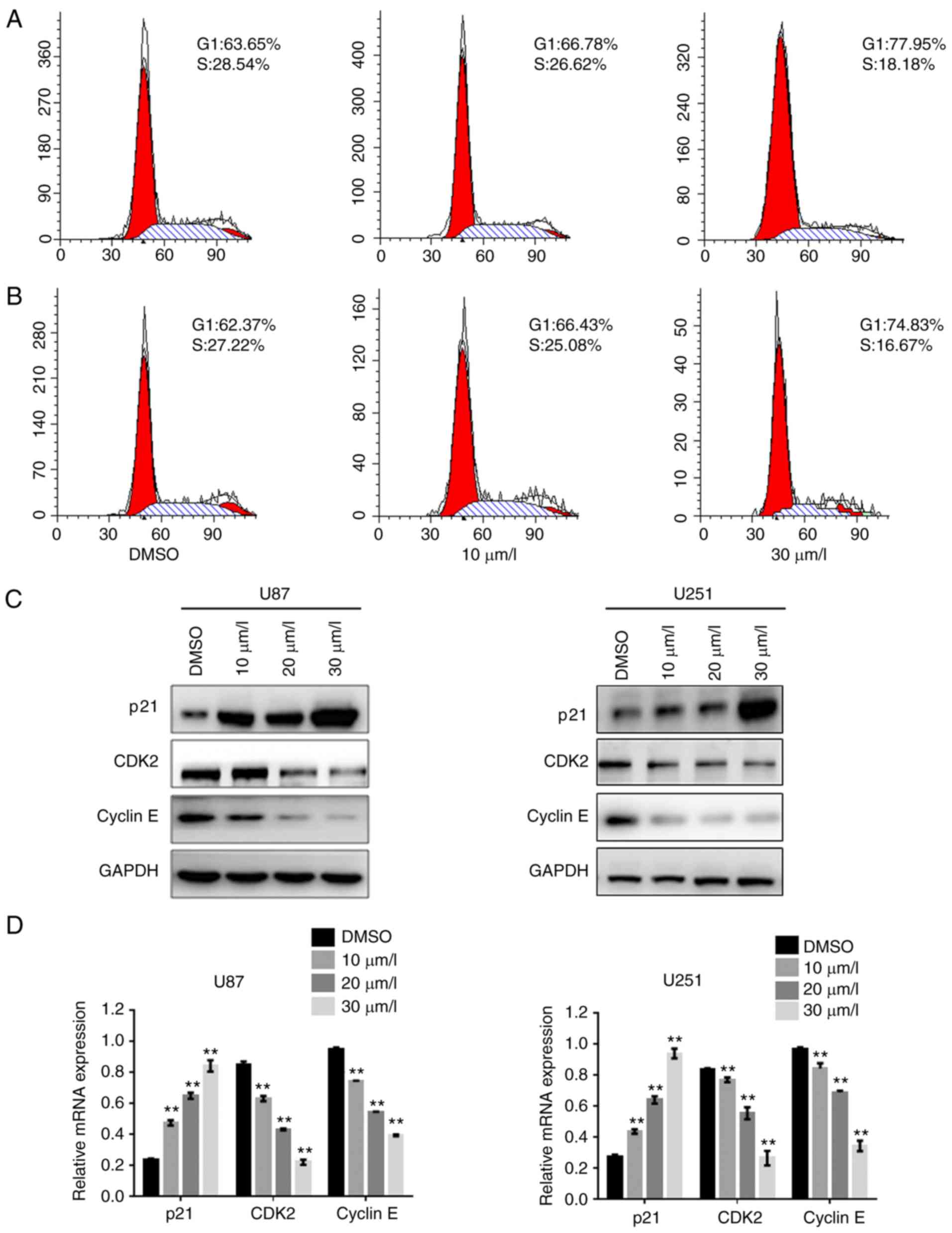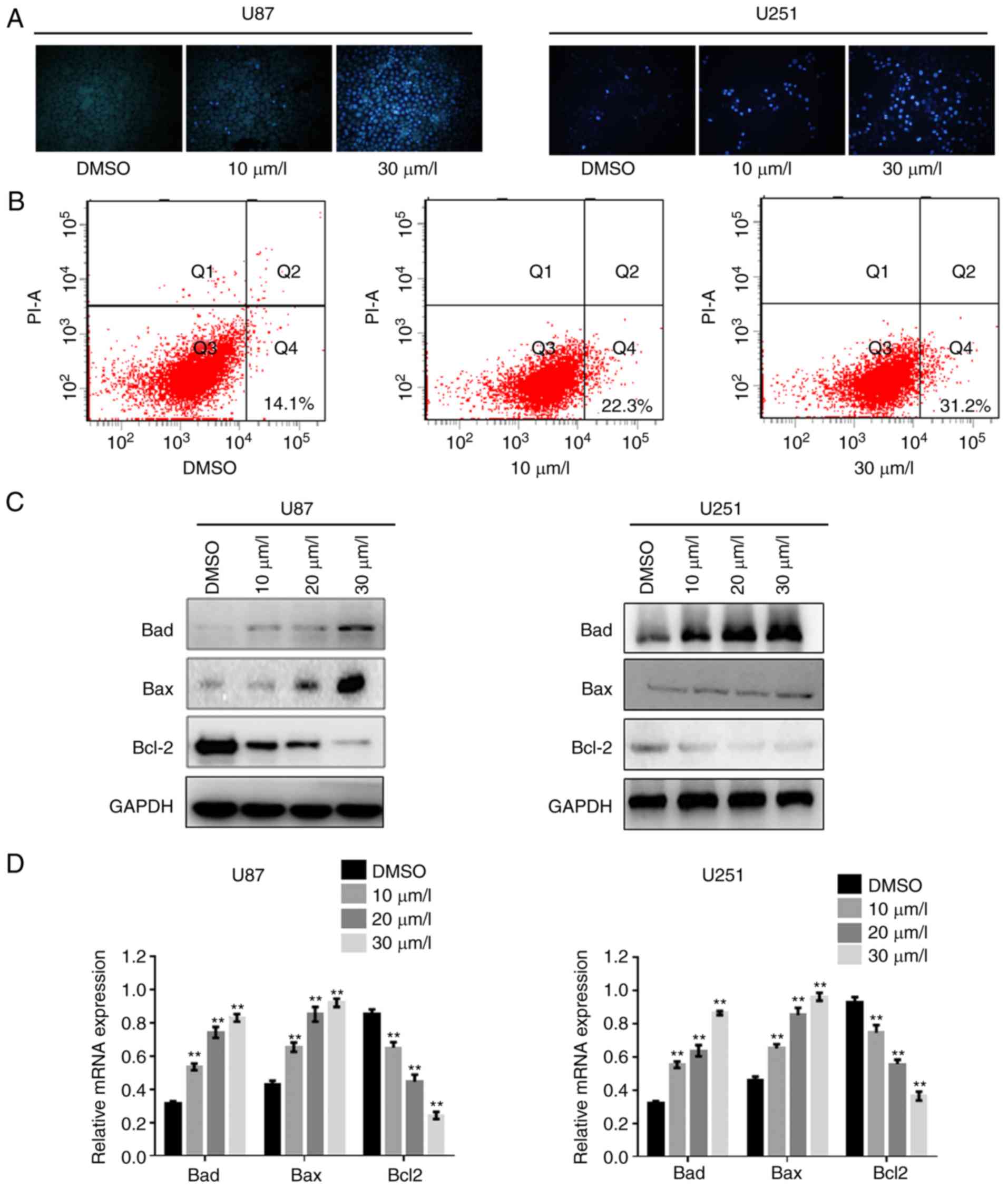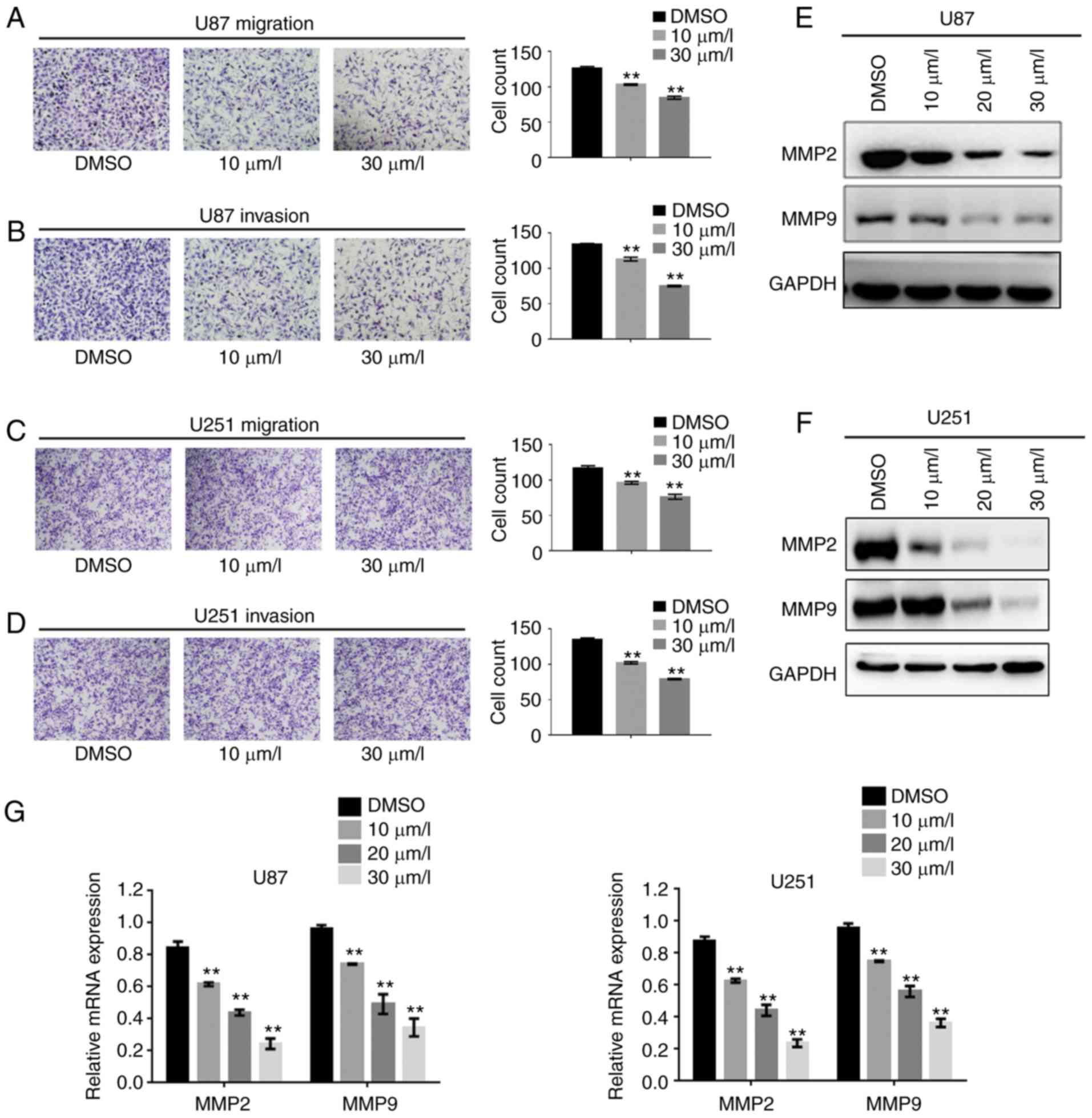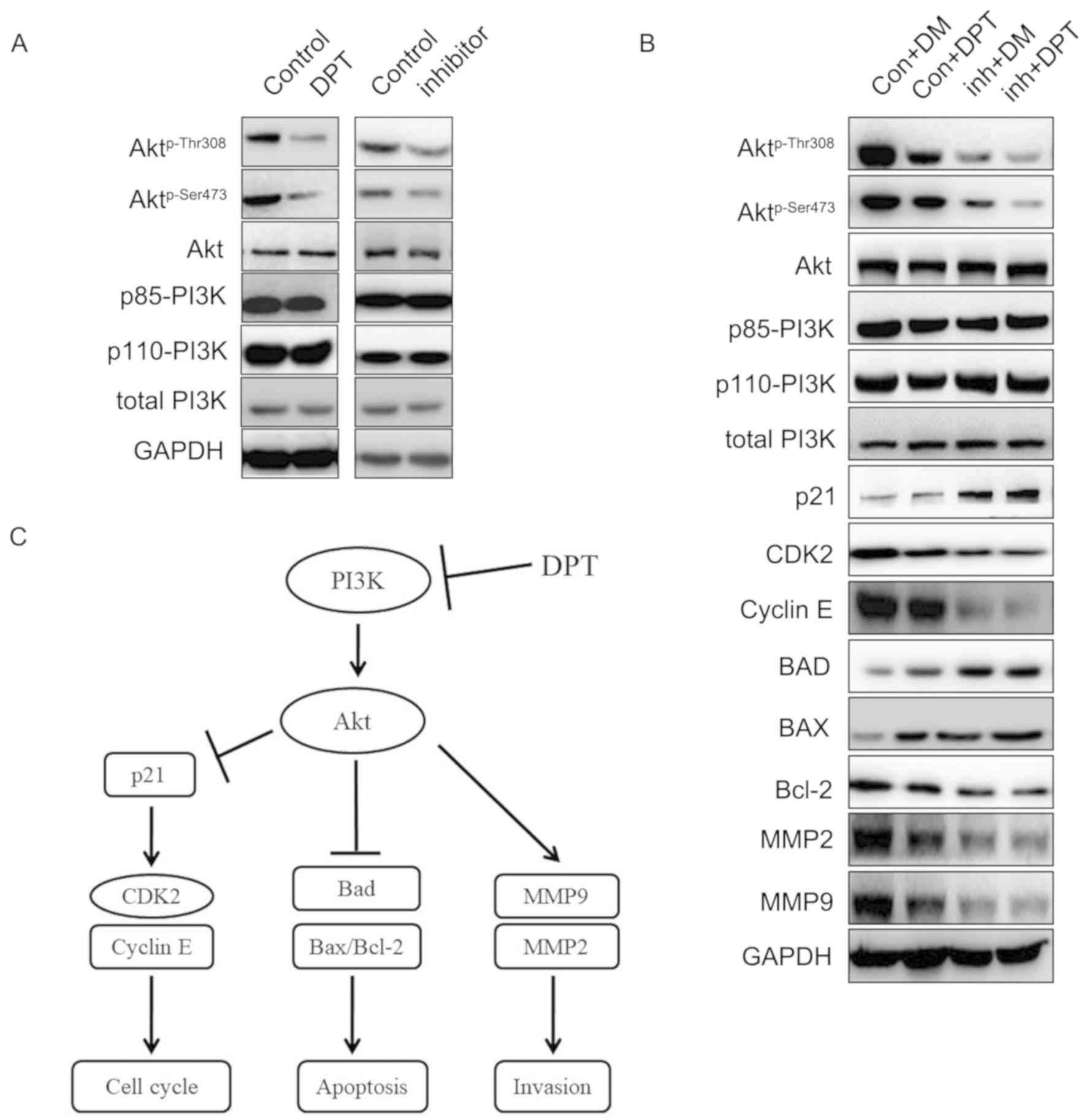|
1
|
Kohler BA, Ward E, McCarthy BJ, Schymura
MJ, Ries LA, Eheman C, Jemal A, Anderson RN, Ajani UA and Edwards
BK: Annual report to the nation on the status of cancer, 1975–2007,
featuring tumors of the brain and other nervous system. J Natl
Cancer Inst. 103:714–736. 2011. View Article : Google Scholar : PubMed/NCBI
|
|
2
|
Cloughesy TF, Cavenee WK and Mischel PS:
Glioblastoma: From molecular pathology to targeted treatment. Ann
Rev Pathol. 9:1–25. 2014. View Article : Google Scholar
|
|
3
|
Olar A and Aldape KD: Using the molecular
classification of glioblastoma to inform personalized treatment. J
Pathol. 232:165–177. 2014. View Article : Google Scholar : PubMed/NCBI
|
|
4
|
Li X, Wu C, Chen N, Gu H, Yen A, Cao L,
Wang E and Wang L: PI3K/Akt/mTOR signaling pathway and targeted
therapy for glioblastoma. Oncotarget. 7:33440–33450.
2016.PubMed/NCBI
|
|
5
|
Okkenhaug K, Graupera M and Vanhaesebroeck
B: Targeting PI3K in cancer: Impact on tumor cells, their
protective stroma, angiogenesis, and immunotherapy. Cancer Discov.
6:1090–1105. 2016. View Article : Google Scholar : PubMed/NCBI
|
|
6
|
Fruman DA, Chiu H, Hopkins BD, Bagrodia S,
Cantley LC and Abraham RT: The PI3K pathway in human disease. Cell.
170:605–635. 2017. View Article : Google Scholar : PubMed/NCBI
|
|
7
|
Paw I, Carpenter RC, Watabe K, Debinski W
and Lo HW: Mechanisms regulating glioma invasion. Cancer Lett.
362:1–7. 2015. View Article : Google Scholar : PubMed/NCBI
|
|
8
|
Fan QW, Nicolaides TP and Weiss WA:
Inhibiting 4EBP1 in glioblastoma. Clin Cancer Res. 24:14–21. 2018.
View Article : Google Scholar : PubMed/NCBI
|
|
9
|
Oh T, Ivan ME, Sun MZ, Safaee M,
Fakurnejad S, Clark AJ, Sayegh ET, Bloch O and Parsa AT: PI3K
pathway inhibitors: Potential prospects as adjuncts to vaccine
immunotherapy for glioblastoma. Immunotherapy. 6:737–753. 2014.
View Article : Google Scholar : PubMed/NCBI
|
|
10
|
Lai K, Killingsworth MC and Lee CS: Gene
of the month: PIK3CA. J Clin Pathol. 68:253–257. 2015. View Article : Google Scholar : PubMed/NCBI
|
|
11
|
Loike JD, Brewer CF, Sternlicht H, Gensler
WJ and Horwitz SB: Structure-activity study of the inhibition of
microtubule assembly in vitro by podophyllotoxin and its congeners.
Cancer Res. 38:2688–2693. 1978.PubMed/NCBI
|
|
12
|
Abad A, Lopez-Perez JL, del Olmo E,
García-Fernández LF, Francesch A, Trigili C, Barasoain I, Andreu
JM, Díaz JF and San Feliciano A: Synthesis and antimitotic and
tubulin interaction profiles of novel pinacol derivatives of
podophyllotoxins. J Med Chem. 55:6724–6737. 2012. View Article : Google Scholar : PubMed/NCBI
|
|
13
|
Zilla MK, Nayak D, Amin H, Nalli Y, Rah B,
Chakraborty S, Kitchlu S, Goswami A and Ali A:
4′-Demethyl-deoxypodophyllotoxin glucoside isolated from
Podophyllum hexandrum exhibits potential anticancer
activities by altering Chk-2 signaling pathway in MCF-7 breast
cancer cells. Chem-Biol Interact. 224:100–107. 2014. View Article : Google Scholar : PubMed/NCBI
|
|
14
|
Shin SY, Yong Y, Kim CG, Lee YH and Lim Y:
Deoxypodophyllotoxin induces G2/M cell cycle arrest and
apoptosis in HeLa cells. Cancer Lett. 287:231–239. 2010. View Article : Google Scholar : PubMed/NCBI
|
|
15
|
Johnstone RW, Ruefli AA and Lowe SW:
Apoptosis: A link between cancer genetics and chemotherapy. Cell.
108:153–164. 2002. View Article : Google Scholar : PubMed/NCBI
|
|
16
|
Benzina S, Harquail J, Jean S, Beauregard
AP, Colquhoun CD, Carroll M, Bos A, Gray CA and Robichaud GA:
Deoxypodophyllotoxin isolated from Juniperus communis induces
apoptosis in breast cancer cells. Anticancer Agents Med Chem.
15:79–88. 2015. View Article : Google Scholar : PubMed/NCBI
|
|
17
|
Hu S, Zhou Q, Wu WR, Duan YX, Gao ZY, Li
YW and Lu Q: Anticancer effect of deoxypodophyllotoxin induces
apoptosis of human prostate cancer cells. Oncol Lett. 12:2918–2923.
2016. View Article : Google Scholar : PubMed/NCBI
|
|
18
|
Wang YR, Xu Y, Jiang ZZ, Guerram M, Wang
B, Zhu X and Zhang LY: Deoxypodophyllotoxin induces G2/M cell cycle
arrest and apoptosis in SGC-7901 cells and inhibits tumor growth in
vivo. Molecules. 20:1661–1675. 2015. View Article : Google Scholar : PubMed/NCBI
|
|
19
|
Wang Y, Wang B, Guerram M, Sun L, Shi W,
Tian C, Zhu X, Jiang Z and Zhang L: Deoxypodophyllotoxin suppresses
tumor vasculature in HUVECs by promoting cytoskeleton remodeling
through LKB1-AMPK dependent Rho A activation. Oncotarget.
6:29497–29512. 2015.PubMed/NCBI
|
|
20
|
Park BR, Lee SA, Moon SM and Kim CS:
Anthricininduced caspasedependent apoptosis through IGF1R/PI3K/AKT
pathway inhibition in A549 human nonsmall lung cancer cells. Oncol
Rep. 39:2769–2776. 2018.PubMed/NCBI
|
|
21
|
Kim SH, Son KM, Kim KY, Yu SN, Park SG,
Kim YW, Nam HW, Suh JT, Ji JH and Ahn SC: Deoxypodophyllotoxin
induces cytoprotective autophagy against apoptosis via inhibition
of PI3K/AKT/mTOR pathway in osteosarcoma U2OS cells. Pharmacol Rep.
69:878–884. 2017. View Article : Google Scholar : PubMed/NCBI
|
|
22
|
Jung CH, Kim H, Ahn J, Jung SK, Um MY, Son
KH, Kim TW and Ha TY: Anthricin isolated from Anthriscus
sylvestris (L.) hoffm. inhibits the growth of breast cancer
cells by inhibiting Akt/mTOR signaling, and Its apoptotic effects
are enhanced by autophagy inhibition. Evid Based Complement
Alternat Med. 2013:3852192013. View Article : Google Scholar : PubMed/NCBI
|
|
23
|
Guerram M, Jiang ZZ, Sun L, Zhu X and
Zhang LY: Antineoplastic effects of deoxypodophyllotoxin, a potent
cytotoxic agent of plant origin, on glioblastoma U-87 MG and SF126
cells. Pharmacol Rep. 67:245–252. 2015. View Article : Google Scholar : PubMed/NCBI
|
|
24
|
Ma D, Lu B, Feng C, Wang C, Wang Y, Luo T,
Feng J, Jia H, Chi G, Luo Y, et al: Deoxypodophyllotoxin triggers
parthanatos in glioma cells via induction of excessive ROS. Cancer
Lett. 371:194–204. 2016. View Article : Google Scholar : PubMed/NCBI
|
|
25
|
Livak KJ and Schmittgen TD: Analysis of
relative gene expression data using real-time quantitative PCR and
the 2−ΔΔCT method. Methods. 25:402–408. 2001. View Article : Google Scholar : PubMed/NCBI
|
|
26
|
Zinkel S, Gross A and Yang E: BCL2 family
in DNA damage and cell cycle control. Cell Death Differ.
13:1351–1359. 2006. View Article : Google Scholar : PubMed/NCBI
|
|
27
|
Guan XW, Xu XH, Feng SL, Tang ZB, Chen SW
and Hui L: Synthesis of hybrid
4-deoxypodophyllotoxin-5-fluorouracil compounds that inhibit
cellular migration and induce cell cycle arrest. Bioorg Med Chem
Lett. 26:1561–1566. 2016. View Article : Google Scholar : PubMed/NCBI
|
|
28
|
Suh SJ, Kim JR, Jin UH, Choi HS, Chang YC,
Lee YC, Kim SH, Lee IS, Moon TC, Chang HW, et al:
Deoxypodophyllotoxin, flavolignan, from Anthriscus
sylvestris Hoffm. inhibits migration and MMP-9 via MAPK
pathways in TNF-alpha-induced HASMC. Vascul Pharmacol. 51:13–20.
2009. View Article : Google Scholar : PubMed/NCBI
|
|
29
|
Tang Y, Lv P, Sun Z, Han L and Zhou W:
14-3-3β Promotes migration and invasion of human hepatocellular
carcinoma cells by modulating expression of MMP2 and MMP9 through
PI3K/Akt/NF-κB pathway. PLoS One. 11:e01460702016. View Article : Google Scholar : PubMed/NCBI
|
|
30
|
Balca-Silva J, Matias D, Carmo AD,
Sarmento-Ribeiro AB, Lopes MC and Moura-Neto V: Cellular and
molecular mechanisms of glioblastoma malignancy: Implications in
resistance and therapeutic strategies. Semin Cancer Biol.
2018.PubMed/NCBI
|
|
31
|
Miller JJ and Wen PY: Emerging targeted
therapies for glioma. Expert Opin Emerg Drugs. 21:441–452. 2016.
View Article : Google Scholar : PubMed/NCBI
|
|
32
|
Engelman JA, Luo J and Cantley LC: The
evolution of phosphatidylinositol 3-kinases as regulators of growth
and metabolism. Nat Rev Genet. 7:606–619. 2006. View Article : Google Scholar : PubMed/NCBI
|
|
33
|
Parsons DW, Jones S, Zhang X, Lin JC,
Leary RJ, Angenendt P, Mankoo P, Carter H, Siu IM, Gallia GL, et
al: An integrated genomic analysis of human glioblastoma
multiforme. Science. 321:1807–1812. 2008. View Article : Google Scholar : PubMed/NCBI
|
|
34
|
Jin Y, Liu J, Huang WT, Chen SW and Hui L:
Synthesis and biological evaluation of derivatives of
4-deoxypodophyllotoxin as antitumor agents. Eur J Med Chem.
46:4056–4061. 2011. View Article : Google Scholar : PubMed/NCBI
|
|
35
|
Yang R, Yi L, Dong Z, Ouyang Q, Zhou J,
Pang Y, Wu Y, Xu L and Cui H: Tigecycline inhibits glioma growth by
regulating miRNA-199b-5p-HES1-AKT pathway. Mol Cancer Ther.
15:421–429. 2016. View Article : Google Scholar : PubMed/NCBI
|
|
36
|
Chao Y, Wang Y, Liu X, Ma P, Shi Y, Gao J,
Shi Q, Hu J, Yu R and Zhou X: Mst1 regulates glioma cell
proliferation via the AKT/mTOR signaling pathway. J Neurooncol.
121:279–288. 2015. View Article : Google Scholar : PubMed/NCBI
|
|
37
|
Lee CW, Hsu LF, Lee MH, Lee IT, Liu JF,
Chiang YC and Tsai MH: Extracts of artocarpus communis induce
mitochondria-associated apoptosis via pro-oxidative activity in
human glioblastoma cells. Front Pharmacol. 9:4112018. View Article : Google Scholar : PubMed/NCBI
|
|
38
|
Lee WS, Woo EY, Kwon J, Park MJ, Lee JS,
Han YH and Bae IH: Bcl-w enhances mesenchymal changes and
invasiveness of glioblastoma cells by inducing nuclear accumulation
of beta-catenin. PLoS One. 8:e680302013. View Article : Google Scholar : PubMed/NCBI
|
|
39
|
Kubiatowski T, Jang T, Lachyankar MB,
Salmonsen R, Nabi RR, Quesenberry PJ, Litofsky NS, Ross AH and
Recht LD: Association of increased phosphatidylinositol 3-kinase
signaling with increased invasiveness and gelatinase activity in
malignant gliomas. J Neurosurg. 95:480–488. 2001. View Article : Google Scholar : PubMed/NCBI
|
|
40
|
Liu Y, Zheng J, Zhang Y, Wang Z, Yang Y,
Bai M and Dai Y: Fucoxanthin activates apoptosis via inhibition of
PI3K/Akt/mTOR pathway and suppresses invasion and migration by
restriction of p38-MMP-2/9 pathway in human glioblastoma cells.
Neurochem Res. 41:2728–2751. 2016. View Article : Google Scholar : PubMed/NCBI
|
|
41
|
Zhang FY, Hu Y, Que ZY, Wang P, Liu YH,
Wang ZH and Xue YX: Shikonin inhibits the migration and invasion of
human glioblastoma cells by targeting phosphorylated beta-catenin
and phosphorylated PI3K/Akt: A potential mechanism for the
anti-glioma efficacy of a traditional chinese herbal medicine. Int
J Mol Sci. 16:23823–23848. 2015. View Article : Google Scholar : PubMed/NCBI
|
|
42
|
Burke JE and Williams RL: Synergy in
activating class I PI3Ks. Trends Biochem Sci. 40:88–100. 2015.
View Article : Google Scholar : PubMed/NCBI
|
|
43
|
Lu S, Jang H, Gu S, Zhang J and Nussinov
R: Drugging ras GTPase: A comprehensive mechanistic and signaling
structural view. Chem Soc Rev. 45:4929–4952. 2016. View Article : Google Scholar : PubMed/NCBI
|
|
44
|
Manning BD and Toker A: AKT/PKB signaling:
Navigating the network. Cell. 169:381–405. 2017. View Article : Google Scholar : PubMed/NCBI
|
|
45
|
Pridham KJ, Varghese RT and Sheng Z: The
role of class IA phosphatidylinositol-4,5-bisphosphate 3-kinase
catalytic subunits in glioblastoma. Front Oncol. 7:3122017.
View Article : Google Scholar : PubMed/NCBI
|
|
46
|
Zhao HF, Wang J, Shao W, Wu CP, Chen ZP,
To ST and Li WP: Recent advances in the use of PI3K inhibitors for
glioblastoma multiforme: Current preclinical and clinical
development. Mol Cancer. 16:1002017. View Article : Google Scholar : PubMed/NCBI
|
|
47
|
Domchek SM, Auger KR, Chatterjee S, Burke
TR Jr and Shoelson SE: Inhibition of SH2 domain/phosphoprotein
association by a nonhydrolyzable phosphonopeptide. Biochemistry.
31:9865–9870. 1992. View Article : Google Scholar : PubMed/NCBI
|
|
48
|
Rodriguez-Viciana P, Warne PH, Dhand R,
Vanhaesebroeck B, Gout I, Fry MJ, Waterfield MD and Downward J:
Phosphatidylinositol-3-OH kinase as a direct target of Ras. Nature.
370:527–532. 1994. View Article : Google Scholar : PubMed/NCBI
|
|
49
|
Gupta S, Ramjaun AR, Haiko P, Wang Y,
Warne PH, Nicke B, Nye E, Stamp G, Alitalo K and Downward J:
Binding of ras to phosphoinositide 3-kinase p110alpha is required
for ras-driven tumorigenesis in mice. Cell. 129:957–968. 2007.
View Article : Google Scholar : PubMed/NCBI
|















